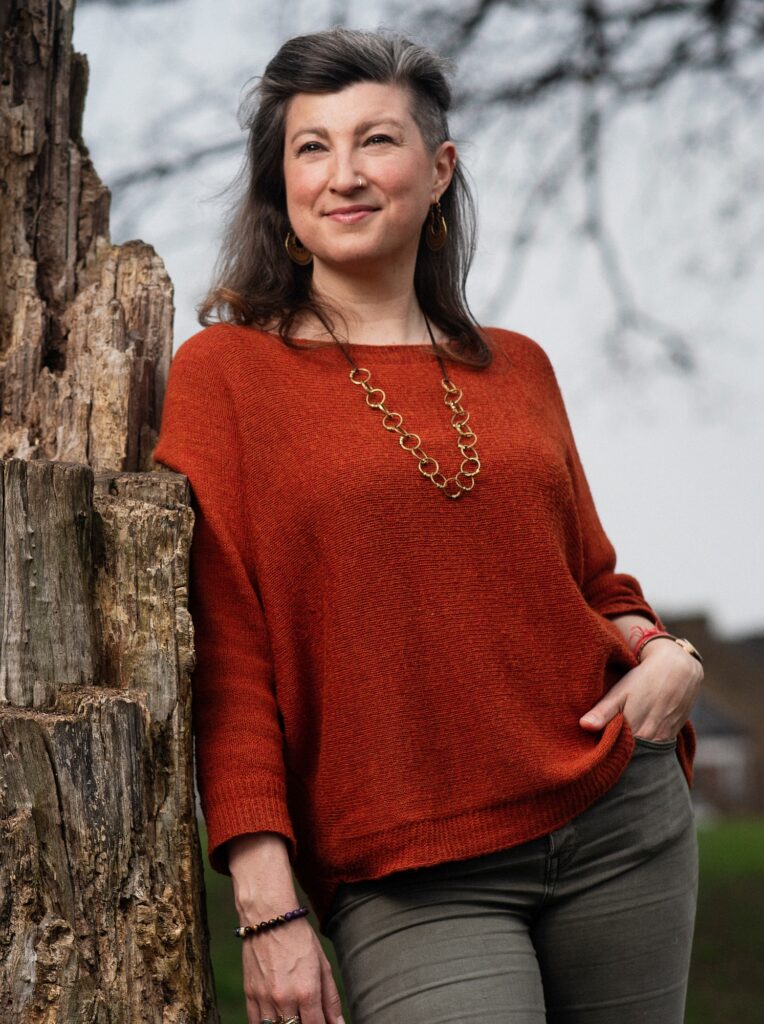 How often do you sing with other people? We might sing Happy Birthday a couple of times a year. Perhaps we’ll go to a wedding and awkwardly creak our way through a hymn that we learned at school and didn’t even like much then. Occasionally we might get swept up in a karaoke night with colleagues or a chant at a football match. But for most people, unless we actively choose to make a regular commitment to joining a choir, there’s no real opportunity in our day-to-day lives for the joy of singing in community.
How often do you sing with other people? We might sing Happy Birthday a couple of times a year. Perhaps we’ll go to a wedding and awkwardly creak our way through a hymn that we learned at school and didn’t even like much then. Occasionally we might get swept up in a karaoke night with colleagues or a chant at a football match. But for most people, unless we actively choose to make a regular commitment to joining a choir, there’s no real opportunity in our day-to-day lives for the joy of singing in community.
As a child, I loved singing. I loved choirs. I loved making music with other people. And it became one of the ways that I would gain approval from my parents and from other adults. Looking back, there were times when I was singing that I found really enjoyable – the times when I was completely in flow, and it was all just about the joy of taking part and creativity. There were other times that were more complex; when I now see that performing had become almost a type of fawning, a strategy to fill a need for positive attention from the adults around me. But mostly, being a performer seemed a natural way for me to be in the world and make music regularly.
As I got older, that focus shifted, and I was strongly encouraged into getting a ‘proper’ job. I took a biology degree and, in turn, landed a graduate job in diagnostic medicine. I still sang for fun – and I sang in every choir I could get my hands on – but it never occurred to me that I could make a living from singing.
Then in 2005, my personal life changed really significantly. My long-term relationship ended, and it prompted me to look at my immediate future. If I wasn’t going to do the whole ‘marriage and babies’ thing, if I wasn’t going down the road of ‘domestic bliss’, where DID I want to go? That was the point I realised how important singing was to me, and just how enmeshed it was with my own identity and wellbeing.
I’m a ‘bold manoeuvres’ person. Once I’d started wondering if I could really make a go of singing for a living, I very quickly made it possible. I applied to Trinity College of Music and was accepted for a Masters degree in vocal performance. I sold my flat to fund myself through it. I quit my terribly sensible job and flung myself into the totally uncertain waters of being a freelance artist. So many people said, ‘Oh, you’re brave!’ But it didn’t feel brave to me, it felt like the logical next step.
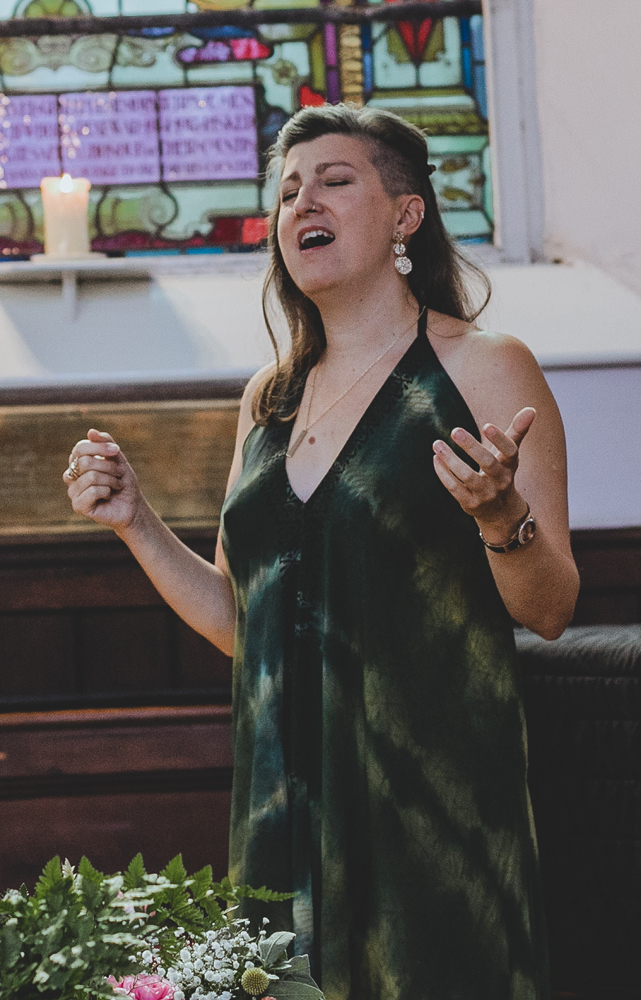 I thoroughly adored my two-year course. I loved being caught up in the intricate details of music-making and creative expression and I adored having the time and space to devote to geeking out on little-known and underappreciated pieces of music and poetry. I embraced music making as an art form. I turned my hand to opera, I turned my hand to sacred choral music, I turned my hand to cabaret. I now turn my hand to folk music. I’m very lucky that singing is an instrument of endless possibilities.
I thoroughly adored my two-year course. I loved being caught up in the intricate details of music-making and creative expression and I adored having the time and space to devote to geeking out on little-known and underappreciated pieces of music and poetry. I embraced music making as an art form. I turned my hand to opera, I turned my hand to sacred choral music, I turned my hand to cabaret. I now turn my hand to folk music. I’m very lucky that singing is an instrument of endless possibilities.
But my private life was less full of joy. At the end of 2009, I had a particularly melodramatic pizza date with two of my girlfriends. I was blethering on about my terrible, dramatic love life and my best friend at the time had enough and lost patience. In the verbal melée that ensued, she gave me the best bit of challenging reflection that I’ve ever received, by simply saying, ‘Oh for goodness sake, you ALWAYS do this!’ She told me I had a clear pattern of seeking relationships with unavailable men. And at the time, I didn’t want to hear it and I sobbed into my Pinot Grigio, feeling thoroughly victimised. The other friend that was with us still feels awkward about that evening to this day. But it was one of the best things that could have happened for me, because once I stopped being in reaction, I started getting curious.
Describing the incident to another friend, a psychoanalyst, I asked him what he thought that might be about. He asked me, ‘Do you REALLY want to know the answer?’ I decided I really did, so I took a deep breath and told him to let me have it straight. ‘You need to find a therapist, and you need to talk about your mum’. He was absolutely right.
So for my next bold manoeuvre, I found a therapist, I started to talk about my childhood and I started to make connections. My mother’s problematic relationship with alcohol was a recurring point of focus. Looking back in therapy on my role as the ‘golden girl’ performer in our family, I started to understand how this had been fuelled not only by my (very real) need for positive adult attention, but by my parents’ need to prove to the outside world that we were a normal, functional family. I’d become the all-singing, all-dancing frontman in our dysfunctional family show, and I played my part really well. ‘Everything’s fine! Nothing to see here!’
As my work in therapy deepened, it became clearer to me how deeply embedded that early sense of responsibility had been and still was. Carrying accountability for other people’s feelings, a tendency to codependent traits – it’s probably a life’s work to gently unpick that and choose to do things differently. And by 2012, my therapist and I were hitting a brick wall. I wouldn’t go into anger, I wouldn’t deal with anger and my therapist described me as ‘a pressure cooker of unexpressed rage’. She told me, ‘If you won’t release it here with me, you need to do it somewhere. You need to find a place where you can express it.’
So it was the cathartic expression work that I came to Hoffman for. I was carrying so much indignation, so much suppressed and righteous rage, that I was ready to go off like a firework. Oh, I was ready! But what I wasn’t ready for was what happens after that. Despite researching the course before I started, the thought of forgiveness for my mother wasn’t something I’d ever considered. I had very clearly constructed the villains and heroes of my childhood experience and I had no intention whatsoever of forgiving anybody, because I was so firmly stuck in that narrative. So when that happened, and compassion and forgiveness naturally came in, it was very unexpected.
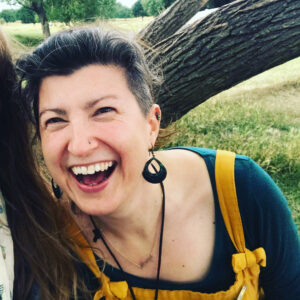 I had hoped that there would be a relief from releasing all of that long-held anger – and there definitely was. In fact, I had a physical response the next day. In the middle of one very quiet session, there was suddenly an loud, audible ‘click’ at the bottom of my spine and another loud ‘click’ at the top of my neck! Freed from the task of holding in all that rage, my body was expanding.
I had hoped that there would be a relief from releasing all of that long-held anger – and there definitely was. In fact, I had a physical response the next day. In the middle of one very quiet session, there was suddenly an loud, audible ‘click’ at the bottom of my spine and another loud ‘click’ at the top of my neck! Freed from the task of holding in all that rage, my body was expanding.
And following the Process, my singing changed. I realised that previously whenever I sang, there had been an energetic feeling of having to hold certain things back, and a pattern of tightly managed control and tension in my body. There was ‘grip’ – and any singing teacher will tell you that tightness and grip are the enemies of good singing. Once that tension was released, I was able to access a new fluidity, soft and gentle muscular control, and an unapologetic outpouring of sound. I also had access to a new emotional and vocal colour palette that was much broader and more vivid. And psychologically, I was no longer singing for the approval of others. I was singing for me. It was glorious!
Self-limiting behaviour around singing happens so much more frequently than even I had realised. I’ve recently been flyering to promote Heart Song Collective around the farmers market and the overground stations at Brockley (where I live) and the number of people who say to me ‘Oh, you don’t want ME in your singing group! I can’t sing!’ It breaks my heart. People share awful stories with me like being told to mime by a teacher in the junior school Christmas concert – and far more often than any of us would like to believe. At some point – at a very tender age – a lot of people were mocked for their singing or criticised for their singing or outright told that they ‘couldn’t sing’. I’m making it my mission to encourage those people to reconnect with their voices as adults and see if they get pleasure from singing. Because THAT’s the missing piece for me.
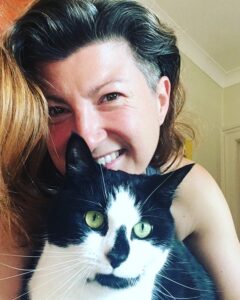 Singing voices are valuable for so many reasons – not just because they make a beautiful, angelic, or commercially saleable sound. Singing voices are valuable because they allow us to explore and express every part of what it is to be human, and when we sing in a group, the energetic result is so much greater than the sum of its parts. To show up and share this unique part of ourselves is an act of extraordinary generosity. Every time somebody who isn’t confident shows up at my Song Medicine sessions and puts themselves and their voice in the space – gives themselves permission to take the risk, and be heard and included – they are giving that permission to another. Every level of experience and confidence is welcome at the weekly Song Medicine gatherings. There are no rehearsals or performances, and no sheet music. I teach simple and soulful songs by ear, and we sing in harmony together for the sheer pleasure and embodied experience of it. The smiles I get at the end of our sessions are so heartwarming! And the closing circle shares are often full of peace, connection, presence and aliveness.
Singing voices are valuable for so many reasons – not just because they make a beautiful, angelic, or commercially saleable sound. Singing voices are valuable because they allow us to explore and express every part of what it is to be human, and when we sing in a group, the energetic result is so much greater than the sum of its parts. To show up and share this unique part of ourselves is an act of extraordinary generosity. Every time somebody who isn’t confident shows up at my Song Medicine sessions and puts themselves and their voice in the space – gives themselves permission to take the risk, and be heard and included – they are giving that permission to another. Every level of experience and confidence is welcome at the weekly Song Medicine gatherings. There are no rehearsals or performances, and no sheet music. I teach simple and soulful songs by ear, and we sing in harmony together for the sheer pleasure and embodied experience of it. The smiles I get at the end of our sessions are so heartwarming! And the closing circle shares are often full of peace, connection, presence and aliveness.
I’m really passionate about people from all walks of life having a place where they can come together and experience the joy and the beauty of singing together in a group. Voices are naturally inclusive; they’re ageless, they’re genderless, and the music I choose allows people to pick the part that FEELS most pleasurable for them. And it truly is medicine. Singing has been scientifically proven to relax your body, regulate and nourish your nervous system, kick off your happy hormones and to allow your mind to calm. It’s actually been shown in a scientific study that singing in a group for 20 minutes allows the heart rates of those individuals to co-regulate and sync up! And co-regulation is a major source of nourishment and resource for our nervous systems, particularly for anyone who lives with anxiety or depression, or who is recovering from trauma.
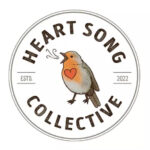 So this is my heart project; this is my soul project. Heart Song Collective is my next bold manoeuvre. I want to enable change for people who may not have been blessed with a physiologically shiny larynx that just so happens to make ‘pretty’ sounds. I want there to be the opportunity for everybody to sing along together in a group and have a lovely time, for people without the privilege of a formal music education to sing out. And without exception, I want to offer people the opportunity to sing out boldly, to sing with confidence and to sing with complete disregard to the question, ‘am I good enough?’
So this is my heart project; this is my soul project. Heart Song Collective is my next bold manoeuvre. I want to enable change for people who may not have been blessed with a physiologically shiny larynx that just so happens to make ‘pretty’ sounds. I want there to be the opportunity for everybody to sing along together in a group and have a lovely time, for people without the privilege of a formal music education to sing out. And without exception, I want to offer people the opportunity to sing out boldly, to sing with confidence and to sing with complete disregard to the question, ‘am I good enough?’
To find out more about Assamiya’s Heart Song Collective, click here www.heartsongcollective.co.uk
To learn more about her weekly Song Medicine gatherings in South East London, click here: https://buytickets.at/heartsongcollective.
Instagram: @assamiyazoe
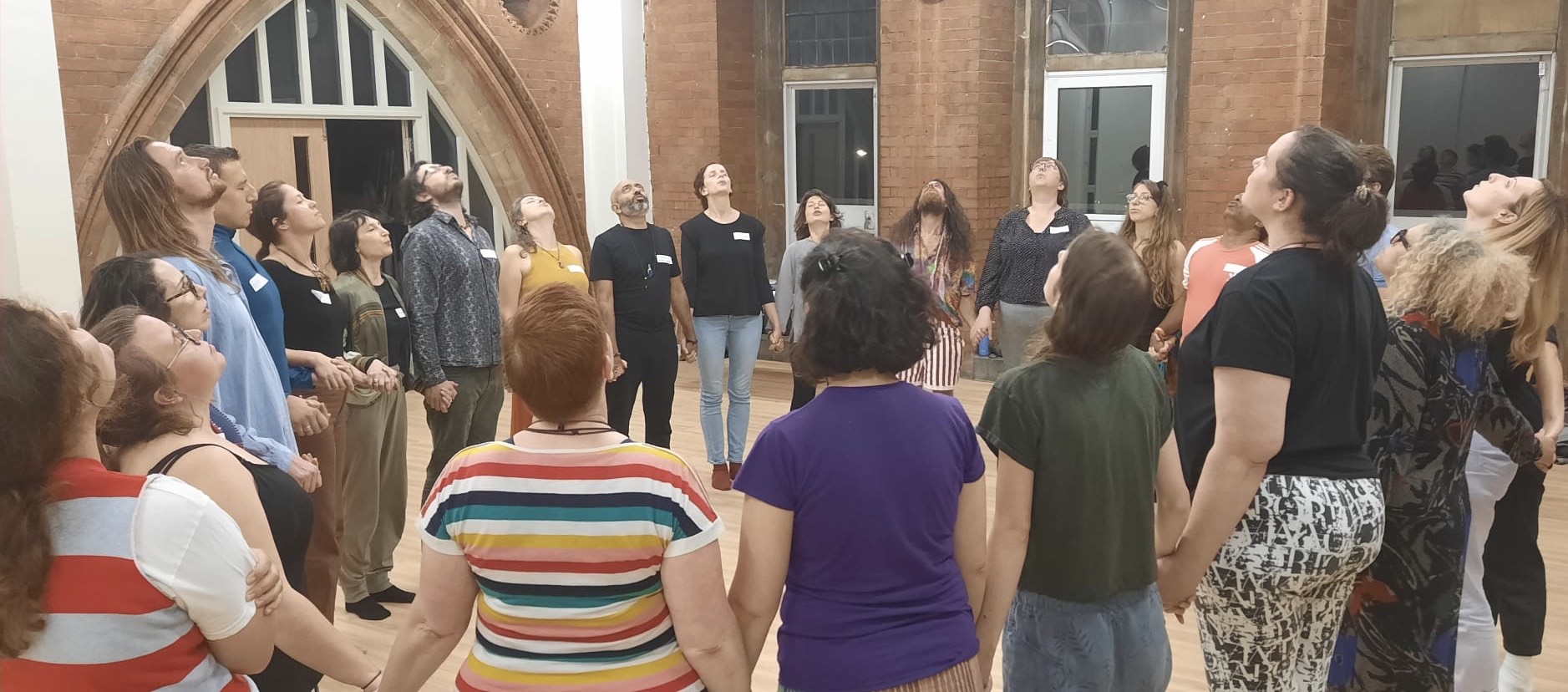





 Sign up to receive monthly newsletters from Hoffman
Sign up to receive monthly newsletters from Hoffman